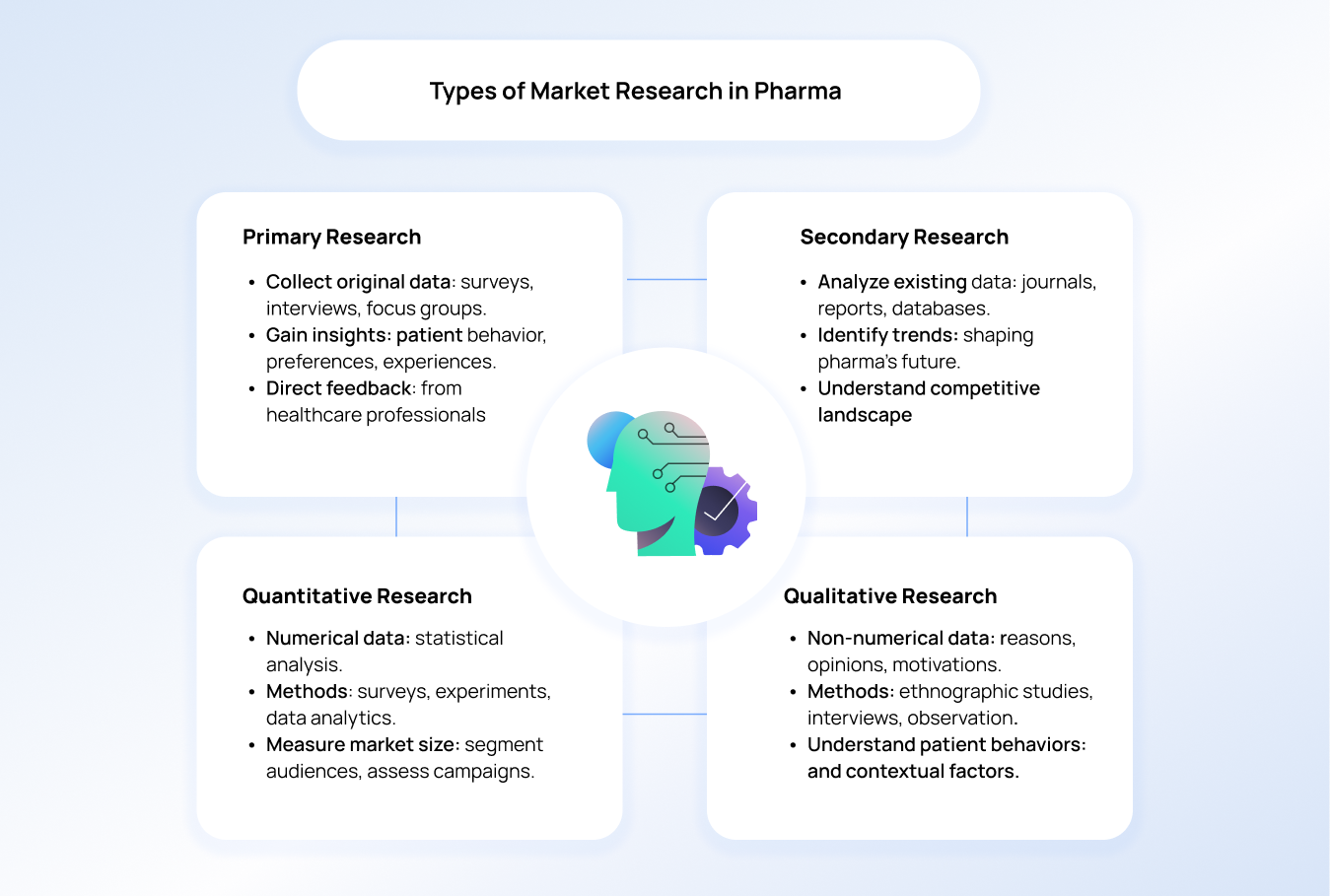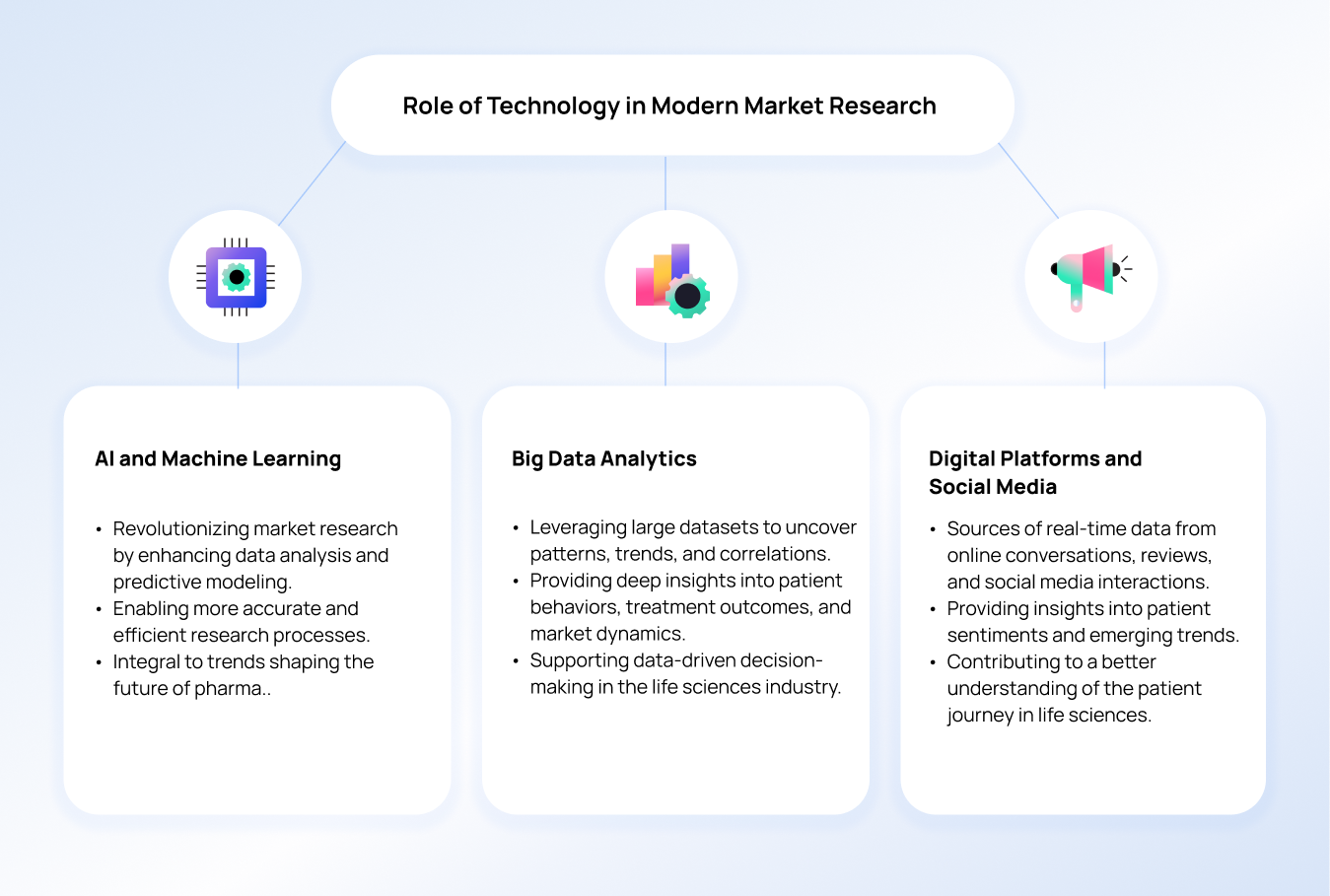Market research is a critical component in the life sciences and biopharma industries, providing the necessary insights to make informed business decisions. This comprehensive guide aims to highlight the importance, types, key components, tools, and best practices of market research in pharma while addressing common challenges and future trends. Understanding market dynamics, including the patient journey in life sciences and the trends shaping the future of pharma, can significantly enhance strategic decision-making and competitive positioning.
The Importance of Market Research in Pharma
Pharma market research enables companies to understand market needs, identify opportunities, and develop effective strategies to stay competitive. Market research helps in navigating key challenges and opportunities in the life sciences industry, ensuring that decisions are data-driven and aligned with market demands.
Successful market research outcomes can be seen in enhanced product development, optimized marketing campaigns, and improved patient engagement. For instance, understanding the patient journey in life sciences helps tailor interventions that meet patient needs and preferences.
Types of Market Research in Pharma & Life Sciences Industry
Primary Research
Primary market research in pharma involves collecting original data directly from sources through surveys, interviews, and focus groups. This type of research is invaluable for gaining specific insights into patient behavior, preferences, and experiences. It can also provide direct feedback from healthcare professionals, aiding in understanding the patient journey in life sciences.
Secondary Research
Secondary research involves analyzing existing data from published sources such as scientific journals, market reports, and industry databases. This pharmaceutical market research type helps identify trends shaping the future of pharma and offers a broad understanding of the competitive landscape.
Quantitative Research
Quantitative research focuses on numerical data and statistical analysis. It involves methods like surveys with closed-ended questions, experiments, and data analytics. Quantitative research is essential for measuring market size, segmenting target audiences, and assessing the effectiveness of marketing campaigns through data-driven decision-making.
Qualitative Research
Qualitative research explores non-numerical data to understand underlying reasons, opinions, and motivations. Methods include ethnographic studies, in-depth interviews, and observational research. Qualitative insights are crucial for understanding complex patient behaviors and the contextual factors influencing healthcare decisions.

Key Components of a Market Research Study
Defining Objectives
Setting clear and actionable research goals is the first step in a pharma market research study. Objectives should align with the overall business strategy and address specific research questions, such as improving patient engagement or optimizing promotional strategies. Aligning objectives with the role of consulting in pharma success can lead to more impactful outcomes.
Research Design
Selecting appropriate methodologies and tools is essential for gathering relevant data. The research design should be tailored to meet the defined objectives, whether it's exploring the patient journey or analyzing market trends.
Data Collection
Gathering data through various means, such as surveys, interviews, and digital analytics, forms the core of pharmaceutical market research. Effective data collection tools are necessary to ensure data accuracy and reliability, which is critical for understanding the patient journey in life sciences.
Data Analysis
Techniques for analyzing and interpreting data include statistical analysis, thematic coding, and trend identification. Data analysis enables organizations to derive actionable insights and make informed decisions, emphasizing the importance of data-driven decision-making.
Reporting and Presentation
Effectively communicating findings through reports and presentations is vital for stakeholder engagement. Visual aids, executive summaries, and actionable recommendations help in translating pharma market research insights into strategic actions.
Tools and Techniques for Market Research
Data Collection Tools
Surveys, questionnaires, and interviews are fundamental tools for collecting data. These tools help gather insights into patient experiences, healthcare professional opinions, and market dynamics, enhancing understanding of the patient journey in life sciences.
Analytical Tools
Software for statistical analysis and data visualization, such as SPSS, R, and Tableau, are crucial for processing and presenting data. Analytical tools support data-driven decision-making by transforming raw data into meaningful insights.
Market Analysis Techniques
Techniques like SWOT analysis, PEST analysis, and competitive analysis are used to evaluate the internal and external factors affecting an organization. These techniques provide a comprehensive view of pharma market growth opportunities and threats, aiding in strategic planning.
The Role of Technology in Modern Market Research
AI and Machine Learning
AI and machine learning technologies are revolutionizing market research for pharmaceutical companies by enhancing data analysis and predictive modeling. These technologies are integral to trends shaping the future of pharma, enabling more accurate and efficient research processes.
Also, Read: AI Applications in Qualitative Market Research
Big Data Analytics
Big data analytics leverages large datasets to uncover patterns, trends, and correlations. In the life sciences industry, big data analytics can provide deep insights into patient behaviors, treatment outcomes, and market dynamics, supporting data-driven decision-making.
Digital Platforms and Social Media
Digital platforms and social media are valuable sources of real-time data. Monitoring online conversations, reviews, and social media interactions can provide insights into patient sentiments and emerging trends, contributing to a better understanding of the patient journey in life sciences.

Best Practices for Conducting Market Research in Pharma
Ethical Considerations
Ensuring compliance with ethical standards is paramount in pharma market research. Ethical considerations include obtaining informed consent, protecting participant confidentiality, and ensuring data integrity. Adhering to ethical practices is essential for understanding the patient journey in life sciences.
Maintaining Data Integrity
Maintaining data integrity involves implementing robust data management and security measures. Accurate and reliable data is crucial for data-driven decision-making and ensuring research validity.
Continuous Improvement
Market research should be an iterative process, with continuous refinement of research strategies based on new insights and changing market dynamics. Consulting in pharma success plays a significant role in providing expert guidance and ensuring continuous improvement.
Challenges and Solutions in Pharma Market Research
Common Challenges
Market research in pharmaceutical faces several challenges, including data accuracy, participant recruitment, and budget constraints. Identifying key challenges and opportunities in the pharma and life sciences industry is essential for developing effective research strategies.
Proposed Solutions
Innovative approaches, such as leveraging technology and adopting flexible research methodologies, can help overcome common challenges. Solutions should focus on enhancing data quality, improving participant engagement, and optimizing resource allocation.
Future Trends in Market Research for Life Sciences

Emerging Technologies
Technologies like AI, machine learning, and blockchain are transforming pharma market research. These technologies are part of the trends shaping the future of pharma, enabling more precise and efficient research processes.
Changing Regulatory Landscape
The regulatory landscape in life sciences is continuously evolving. Adapting to new regulations is a key challenge and opportunity in the life sciences industry, requiring agile research methodologies and compliance strategies.
Evolving Market Dynamics
Understanding the patient journey in life sciences helps companies adapt to changing market dynamics. By staying attuned to patient needs and preferences, organizations can develop more effective products and services.
Conclusion
Market research in pharma is a vital tool for pharmaceutical and biotech companies, providing the insights needed to navigate the competitive landscape and achieve business objectives. By understanding the patient journey in life sciences and leveraging data-driven decision-making, companies can address key challenges and opportunities in the life sciences industry. Consulting in pharma success further enhances the impact of pharmaceutical market research, ensuring continuous improvement and strategic alignment.
ZoomRx, a strategic life sciences consulting firm offers specialized services and solutions to support your market research needs. Our expertise in AI-powered business development, sales force effectiveness in pharma, doctor patient dialogue research, and more ensures that your company can optimize its strategies and achieve its business objectives.
For more information on how ZoomRx can assist with your market research efforts, contact us today.


